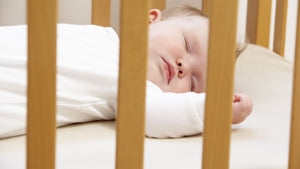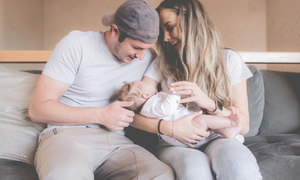Key Points:
- Ensure food safety for babies by sourcing safe foods, practicing good hand hygiene and keeping raw and cooked foods separate.
- Safely prepare and store baby food by keeping fridge temperatures below 3° Celsius.
- Breastfeed as long as possible and introduce appropriate solid foods around six months.
- Be cautious with solid food introduction around six months and focus on iron-rich foods and avoiding unsafe items.
Food safety is important at all ages and stages of life, but for babies and young children it’s particularly wise for parents to be careful about their food. Babies have immature digestion and immune systems and can become sick very easily if they eat contaminated food. Babies can also take longer to recover than adults do and develop complications if they’ve been unwell.
Ten ways to ensure your baby’s food is safe.
There is a range of important factors when it comes to food safety and babies.
- Sourcing safe food. Where possible, know the origins of the food you’re offering your baby. Home cooked baby foods tend to smell, taste and look better than bought foods.
- Always be careful about hand hygiene. Keep soap at your kitchen sink and make sure you have paper towel or a clean towel handy to dry your hands.
- Keep raw and uncooked foods separate and always use separate cutting boards and knives for each one. Contaminated food from blood and juices can easily spread.
- If you’re sick, ask another trusted adult to prepare your baby’s food. Contagious illnesses such as gastroenteritis and diarrhoea are easily spread.
- Prepare and store food safely. Always store food safely, in a refrigerator where the temperature is below 3° Celsius – keep a thermometer in the fridge so you can regularly check the temperature. Put any food which needs to be kept cold into the fridge straight away. Throw away any food which has been left out of the fridge for two or more hours. Defrost frozen foods in the fridge, especially meats. When shopping, take a cooler bag or esky to safely transport foods home.
- Know when not to offer your baby a particular food. If you’re not sure about the safety of food, throw it out. Get into the habit of smelling food before eating it yourself, or offering it to your baby. Bacteria can make food smell and is this is a warning sign that it’s not safe to eat.
- Always check food labels. Use foods by their ‘use-by dates’ and note the ‘best by’ dates as well. Always follow manufacturer’s storage and cooking instructions.
- Be mindful of the potential for your baby to have any allergies. Check here for evidence-based information.
- If your baby is bottle fed, sterilise their bottles and feeding equipment until they’re 12 months of age.
- Cook your baby’s food until it is 60° Celsius, or hotter for some foods. When reheating foods, make sure they’re steaming hot, or at least 60° Wait until the food has cooled down and check the temperature is safe before offering it to your baby.
What else can help to protect my baby?
Breastfeed your baby for as long as possible. Up to two years and beyond is ideal, but if this isn’t possible, aim to breastfeed as much as you can. Exclusively breastfeeding to around six months will help to support your baby’s immune system.
As your baby gets to around six months of age, introduce appropriate solid foods while continuing to breastfeed. If your baby is formula fed, keep offering them formula until they turn one year of age.
Care well for yourself and do what you can to support your own good health. Your milk supply may be affected if you’re sick or rundown.
Listeria is a risk for pregnant women, though breastfeeding women can eat potentially risky foods. This is because the risk of transmitting Listeria to a newborn baby from breastfeeding is extremely low and outweighed by the significant benefits of breastfeeding. If you are ill or taking any medications talk to your health professional. Some medications are contraindicated when breastfeeding and it always beneficial to speak with a pharmacist or doctor first.
Breast milk storage
If you’re expressing and storing your breast milk, make sure you wash and dry your hands carefully before expressing into a sterile bottle or container. It is important to store and defrost expressed breast milk (EBM) carefully. Check here for specifics.
Formula milk storage
Always boil water before making up formula. Use tap water, rather than bottled water, to prepare your baby’s bottles.
Always store formula milk in the back of the fridge where the temperature is coldest. Ideally, make up your baby’s bottles just before their feeds. If it’s easier for you, you can store previously boiled water in sterilised bottles in the fridge, before adding the correct amount of formula scoops.
Signs of readiness for solid foods
When your baby is around six months of age, they will be ready for solid food as well as breast or formula milk. This is because their iron stores which have built up during pregnancy start to decline and they need extra iron, as well as protein and zinc from solid foods to support their growth and development. Iron rich foods are iron fortified baby cereals, pureed meat and chicken, legumes and tofu.
Although most babies are ready for solids from around six months, this time can vary between individual babies. The advice from health professionals is to not offer solid foods before four months of age. This is because milk is so important that solid foods can fill a baby up to the point where they’re not interested in drinking the amount of milk they need to grow and thrive.
Look for your baby to have:
- Good head and neck control and they can sit upright when they’re supported.
- An interest in food – they may start looking at you or your plate when you’re eating.
- An ability to reach for food.
- The skills to open their mouth when you offer them food on a spoon.
- Skills in being able to transfer food from the front of their tongue to the back and then swallow.
You may be interested in the practice of baby led weaning, which is becoming a very popular method of supporting babies to have more control over what and how much food they eat. This is covered in detail in our Baby Feeding Guide.
5 foods which aren’t safe for young babies
- Avoid offering your baby any unmodified milk from animal sources. If your baby is not breastfeeding, they need to be fed on commercially available infant formula until they are one year of age. Raw milk has not undergone pasteurization – a process which helps to kill any bacteria present in the milk. Raw milk and raw milk foods are not suitable or safe for babies.
- Whole nuts can cause choking in children aged less than five years of age. However, nut butters and pastes can be offered from around six months of age.
- Hard, uncooked foods such as carrot or apple. These can cause a baby to choke.
- Raw or undercooked egg – this can cause salmonella poisoning.
- Honey is not recommended for babies aged under 12 months. This is because honey can contain a bacterium which can cause a serious illness, known as botulism.
Other fluids which are considered unsafe are goat’s or soy milk, low fat or reduced fat milks, fruit juice or fruit drinks. Speak with a health care practitioner if you feel your baby needs these as a substitute for breast milk or cow’s milk derived formula.
About the Author:
Written for Nourish Baby by Jane Barry. Jane has qualifications in general, paediatric, immunisation, midwifery and child health nursing. She holds a Bachelor Degree in Applied Science (Nursing) and has almost 35 years specialist experience in child health nursing. She is a member of a number of professionally affiliated organisations including AHPRA, The Australasian Medical Writer’s Association and Australian College of Children and Young People’s Nurses.
References
Mercury in fish (foodstandards.gov.au)
Storing expressed breastmilk | Australian Breastfeeding Association
Our Products
-

01. Guide to a Healthy Pregnancy
$55 -

02. Positive Birthing Course
$55 -

03. Baby Feeding Guide
$55 -

04. Baby Sleep Guide - First 12 Months
$55 -

05. Positive Parenting Course 1 - 3 Years
$55
-
 Is it normal for babies to be noisy?
Is it normal for babies to be noisy?
 Recently we asked Natalie van Winckel, Senior Early Parenting Sleep Consultant and Education Lead from Nourish Baby and Safe Sleep Space, to share her insights into what separates noisy babies from others who are less vocal.
Recently we asked Natalie van Winckel, Senior Early Parenting Sleep Consultant and Education Lead from Nourish Baby and Safe Sleep Space, to share her insights into what separates noisy babies from others who are less vocal. -
 Contraception after birth
Contraception after birth
Most women are fertile two weeks before their period starts. However, breastfeeding can delay the return of periods, making it hard for women to know with any confidence when their ‘fertile window’ may be. This is why some women conceive again before their periods have come back.






 Is it normal for babies to be noisy?
Is it normal for babies to be noisy?
 Contraception after birth
Contraception after birth








